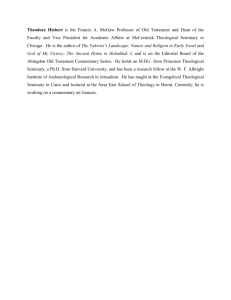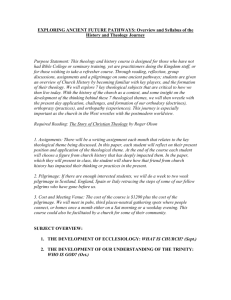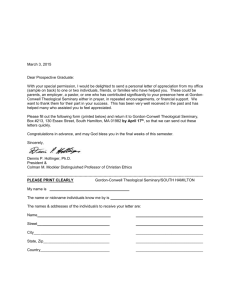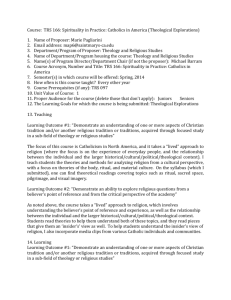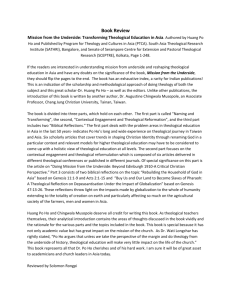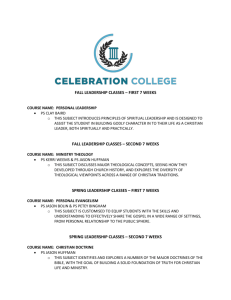Hartford Seminary TH 663: Christian
advertisement
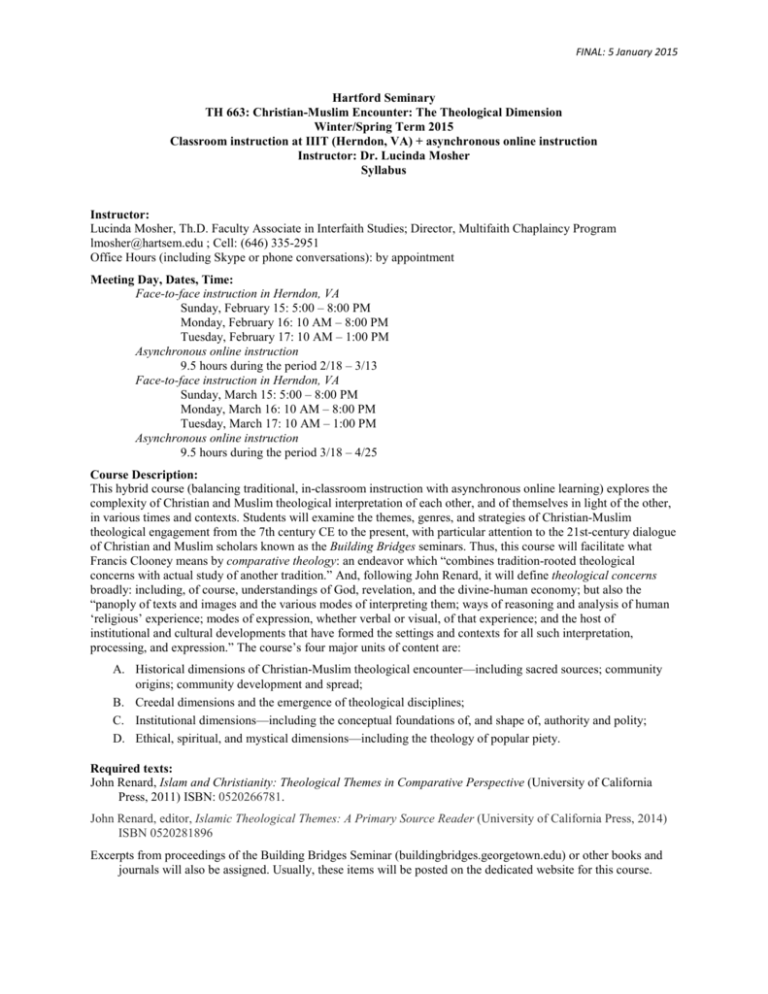
FINAL: 5 January 2015 Hartford Seminary TH 663: Christian-Muslim Encounter: The Theological Dimension Winter/Spring Term 2015 Classroom instruction at IIIT (Herndon, VA) + asynchronous online instruction Instructor: Dr. Lucinda Mosher Syllabus Instructor: Lucinda Mosher, Th.D. Faculty Associate in Interfaith Studies; Director, Multifaith Chaplaincy Program lmosher@hartsem.edu ; Cell: (646) 335-2951 Office Hours (including Skype or phone conversations): by appointment Meeting Day, Dates, Time: Face-to-face instruction in Herndon, VA Sunday, February 15: 5:00 – 8:00 PM Monday, February 16: 10 AM – 8:00 PM Tuesday, February 17: 10 AM – 1:00 PM Asynchronous online instruction 9.5 hours during the period 2/18 – 3/13 Face-to-face instruction in Herndon, VA Sunday, March 15: 5:00 – 8:00 PM Monday, March 16: 10 AM – 8:00 PM Tuesday, March 17: 10 AM – 1:00 PM Asynchronous online instruction 9.5 hours during the period 3/18 – 4/25 Course Description: This hybrid course (balancing traditional, in-classroom instruction with asynchronous online learning) explores the complexity of Christian and Muslim theological interpretation of each other, and of themselves in light of the other, in various times and contexts. Students will examine the themes, genres, and strategies of Christian-Muslim theological engagement from the 7th century CE to the present, with particular attention to the 21st-century dialogue of Christian and Muslim scholars known as the Building Bridges seminars. Thus, this course will facilitate what Francis Clooney means by comparative theology: an endeavor which “combines tradition-rooted theological concerns with actual study of another tradition.” And, following John Renard, it will define theological concerns broadly: including, of course, understandings of God, revelation, and the divine-human economy; but also the “panoply of texts and images and the various modes of interpreting them; ways of reasoning and analysis of human ‘religious’ experience; modes of expression, whether verbal or visual, of that experience; and the host of institutional and cultural developments that have formed the settings and contexts for all such interpretation, processing, and expression.” The course’s four major units of content are: A. Historical dimensions of Christian-Muslim theological encounter—including sacred sources; community origins; community development and spread; B. Creedal dimensions and the emergence of theological disciplines; C. Institutional dimensions—including the conceptual foundations of, and shape of, authority and polity; D. Ethical, spiritual, and mystical dimensions—including the theology of popular piety. Required texts: John Renard, Islam and Christianity: Theological Themes in Comparative Perspective (University of California Press, 2011) ISBN: 0520266781. John Renard, editor, Islamic Theological Themes: A Primary Source Reader (University of California Press, 2014) ISBN 0520281896 Excerpts from proceedings of the Building Bridges Seminar (buildingbridges.georgetown.edu) or other books and journals will also be assigned. Usually, these items will be posted on the dedicated website for this course. Learning Goals As a result of this course, students will gain: • Appreciation for the range of, and reasons for, Christian-Muslim theological engagement; • Ability to identify the major themes of Christian-Muslim theological engagement; • Ability to explain the issues at stake in engagement over several of these themes. • Knowledge of the primary sources informing the theological engagement of Christians and Muslims with each other; • Understanding of the genres and strategies of such engagement. Assessment Students are expected to be present for all face-to-face instruction sessions in Herndon, VA. Students are expected to participate in all 19 hours of online instructional activities, but may do so at their own pace. Please note that “online hours” replace “classroom hours” and will be spent on such activities as watching or listening to a lecture, watching a documentary, posting to a discussion board, or asking and answering questions. Time necessary to complete reading and writing assignments is in addition to the “online instruction hours”. Students are expected to complete all reading, written, and online assignments. Grades will be calculated as follows: A. Participation in face-to-face classes in Herndon (see attendance policy) [30%]; B. Participation in online learning activities as directed by the dedicated website for this course [15%] C. Submission of four short reflection paper (5-10 pages)—one for each course-module—in each case summarizing learnings from that unit’s readings and activities [10% each; 40% total]; D. Submission of a final project or paper on some aspect of Christian-Muslim theological encounter, chosen in conversation with the professor (15-20 pages or the equivalent) [15%]. Attendance Policy Because this class meets only six times face-to-face during two weekends, missing even part of a class session will result in an automatic lowering of your final grade, unless an adequate manner of making up the time and covering the material is negotiated with the instructor. (NOTE: this proviso is offered primarily to accommodate students who enroll in the course after the initial session.) Missing more than two such sessions will result in automatic failure of the course. Participation in all online components is expected; failure to do so is considered an “absence” and will affect one’s final grade. Detailed Course Outline Since this is a “hybrid course,” the course website will be equal to this syllabus as your guide. On the website, you will find that each of this course’s four modules (two face-to-face; two asynchronous online) has a dedicated section with instructions on how to proceed. Module I (taught in Herndon): Historical dimensions of Christian-Muslim theological encounter Topics: Overview of Christian and Islamic theological themes and subdisciplines; sacred sources (bedrock figures and texts); quasi-canonical accounts of community origins; notions of “authentic community”; community development and spread; shared notions of the end of history. Preparation: In Renard, Islam and Christianity, read Prologue, Introduction, and Chapters 1 & 2. In Renard, Islamic Theological Themes, Chapters 1 & 2. In Scriptures in Dialogue (available on our website as a PDF), read Chapter 1 [“When, where, with whom do I read Scripture?” (read at least the first four entries)]; Chapter 2 [essays by Wright and Cornell + texts of Psalm 19 and alRum (30):19-30]. See website for other items related to Module I. 2 Sunday, February 15: 5:00 – 8:30 PM 5:00 Introductions: a) To each other b) To “theology” as a discipline, and comparative theology as a discipline” c) To “dialogue” d) To “close reading” e) To Renard; to the Building Bridges Seminar f) Expectations 5:45 Break for salat 6:00 Lecture: Brief history of Christian-Muslim engagement 7:00 Salat and break 7:15 Lecture: Scripture, Exegesis, and Tradition – foundational texts; theologies of history; defining the “insider” 8:30 Adjourn for the evening Monday, February 16: 10 AM – 8:00 PM 10:00 11:00 11:15 12:15 1:15 3:00 3:30 4:30 5:45 7:15 8:00 Lecture: Introduction to the creedal dimensions of Christianity and Islam Break Lecture: The Church in the Shadow of the Mosque –early Christian-Muslim theological encounters Break for lunch and salat Discussion: “When, where, with whom do I read Scripture?” The sound of sacred texts Break and salat Dialogical engagement: Psalm 19 and al-Rum (30):19-30 Sharing dialogical insights Break for salat and supper (and more salat) TBA: (site visit to ADAMS Center OR lecture on Eschatology) Adjourn for the evening Tuesday, February 17: 10 AM – Noon 10:00 Discussion of latent questions Introduction to course’s online component 12:15 Adjourn F2F module; continue course online Short Essay 1: No later than Sunday, February 22nd, 11:59 PM, as directed by our website, post a short reflection paper (5-10 pages) summarizing learnings from this unit’s readings in conversation with online material. Module II (asynchronous online): Creedal dimensions and the emergence of theological disciplines Topics: Narrative theology; narrative in scripture and postscriptural texts; pedagogical narratives; creedal formulas; systematic theologizing and the emergence of schools of theological thinking Preparation: In Renard, Islam and Christianity, finish reading Chapters 1 & 2 and related material; read Chapters 3 & 4. See also, Islamic Theological Themes, Chapter 4 (through p. 125), Chapters 5 & 6. In Bearing the Word, read two essays: Kadi, “What is prophecy?”; Davis, “My devoted friend”. See supplementary material provided on website. Online learning: It is presumed that you will spend some 6-7 hours watching and taking notes on the following video presentations: a. Introduction to the Building Bridges Seminar: Archbishop Rowan Williams and several participants talk about the Building Bridges Seminar: http://www.youtube.com/watch?v=ZJq5A4U_TVA. 3 b. Bible and Qur’an: a review of composition and structure (narrated PPT lecture by Professor Mosher) c. The Community of Believers: Gavin D’Costa on “Church”; Abdullah Saeed on “umma” https://www.youtube.com/watch?v=CGajU31fHwM. d. The Gospel According to St. Matthew (1964) – film by Pier Paolo Pasolini https://www.youtube.com/watch?v=h7ewh5k5-gY e. Max McLean recites the Gospel of Mark (Max McLean is founder and artistic director of Fellowship for Performing Arts, a New York City-based producer of live theater from a Christian worldview.) 1) 2) 3) 4) 5) f. Chapters 1-3. https://www.youtube.com/watch?v=td3FKGN1AsM Chapter 4-6: https://www.youtube.com/watch?v=Bbp3LqIGq8Y. Chapters 7-9: https://www.youtube.com/watch?v=wnGKueokO0E Chapters 10-12: https://www.youtube.com/watch?v=2PURAFvYt40 Chapters 13-16: https://www.youtube.com/watch?v=CbvWlBtD2rU. Muhammad: Legacy of a Prophet: http://freedocumentaries.org/documentary/pbs-muhammad-legacy-of-aprophet When you have finished watching a video, go to our website Discussion Board. Post a comment about that video (perhaps what you found helpful or surprising; or a question this item raised for you); respond to at least one classmate’s post per video. (This is the online equivalent of “class discussion”. During the month between face-toface modules, it is expected that you’ll spend some 2-3 hours in such activities.) Short essay 2: No later than Friday, 11:59 PM, March 13th, as directed by our website, post a short reflection paper (5-10 pages) summarizing learnings from this unit’s readings in conversation with learnings from the online objects. Module III: Institutional dimensions—including the conceptual foundations of, and shape of, authority and polity Topics: conceptual foundations and shape of authority within community; religious polity; canon/divinely-revealed law; theologies of power; theology and politics; Christian and Muslim intentional communities; Christian and Muslim institutions of higher learning; construction of of cathedrals, monasteries, mosques, and schools; theology of visible structures; spatial arts Preparation: In Renard, Islam and Christianity, read Chapters 5 & 6; see also, Islamic Theological Themes, Chapter 10, p. 371384 (top) on theologies of governance. Watch online narrated PPT lectures: “The Christian Mosaic” and “The Muslim Mosaic” – the internal diversity of each community Sunday, March 15: 5:00 – 8:30 PM 5:00 Supper discussion: reflections on the online experience 6:00 Discussion: The foundations and shape of religious authority – reflections on the internal diversity of Church and Umma 7:00 Break and salat 7:30 Dialogue (scripture TBA) 8:30 Adjourn for the evening Monday, March 16: 10 AM – 8:00 PM 10:00 Lecture: Intentional Religious Communities 12:30 Break for lunch and salat 1:30 Dialogical engagement (Lord’s Prayer and Fatiha) 3:00 Break 3:30 Lecture: Architecture and theology 4:45 Break for salat and supper 6:30 TBA [Site Visit (Orthodox church) or Lecture] 8:00 Adjourn for the evening 4 Tuesday, March 17: 10 AM – Noon 10:00 Lingering questions; planning final papers 12:00 Adjourn F2F module; continue course online Post-Herndon assignment: Online lecture: Seyyed Hossein Nasr on Sunnism and Shi’ism: Yesterday, Today and Tomorrow - http://hartsem.podbean.com/2012/12/07/sunnism-and-shi%E2%80%99ism-yesterday-today-andtomorrow-with-dr-seyyed-hossein-nasr/ Short essay 3: No later than Sunday, 11:59 PM, March 22nd, as directed by our website, post a short reflection paper (5-10 pages) summarizing learnings from this unit’s readings in conversation with learnings from the online objects. UNIT D (asynchronous online): Ethical, spiritual, and mystical dimensions Topics: Scripture and ethics; Tradition/Hadith and ethics; moral-theological literature (and the related theme of human vs. divine agency); sources and models of spirituality; Jesus and Muhammad as paradigms of the inner life; hagiography; spiritual guidance; theological themes of devotion and prayer; popular piety; mysticism; social values in theological ethics/moral theology; faith and social responsibility. Preparation: In Renard, Islam and Christianity, read Chapters 7 & 8 & 9. See also, Islamic Theological Themes, Parts Four and Five. In Bearing the Word, available on our course website, read Ayoub, “ʿIsa and Jesus”; Madigan, “Jesus and Muhammad”. In Building a Better Bridge: Muslims, Christians, and the Common Good, available on our course website, read Tariq Ramadan, “Islamic Views of the Collective,” and John Langan, “The Common Good: Catholicism, Pluralism, and Secular Society”. See supplementary material on course website. Online learning: It is presumed that you will spend about 6-7 hours watching and taking notes on the following video presentations: a. Three-Stranded Ropes: Christian and Muslim moral theology (narrated PPT) b. “Mutual Perceptions” (short papers by Caner Dagli, Daniel Madigan, Rowan Williams, in preparation for Building Bridges seminar on prayer in Christian and Muslim understanding and practice). http://vimeo.com/26970083. c. Michael Plekon and Reza Shah-Kazemi on theology of prayer: http://vimeo.com/26968201 d. The Marrow of Worship and the Moral Vision – ethics lessons from spiritual exemplars (narrated PPT) e. Mysticism (Narrated PPT) f. Selected chanted supplications (audio recordings), including Jawshan al-Kabir (Cevşen’ül Kebir), presented here with Turkish transliteration): https://www.youtube.com/watch?v=dVBZ6cicJAY. g. Allegories a. Pilgrim’s Progress: https://www.youtube.com/watch?v=V_c22M_Z9jc. b. Jamal Rahman on Attar’s allegory, “The Conference of the Birds” on https://www.youtube.com/watch?v=WhINBvR0wzg Short essay 4: No later than Saturday, 11:59 PM, April 25th, as directed by our website, post a short reflection paper (5-10 pages) summarizing learnings from this unit’s readings in conversation with learnings from the online objects. Final Paper: No later than Saturday, 11:59 PM, April 25th, as directed by our website, post your final project or paper on some aspect of Christian-Muslim theological encounter (15-20 pages or the equivalent). If a paper, it should be written in proper academic form. (See hartsem.edu for guidelines.) If some other sort of project, see your professor for guidelines. In this paper or project, you should demonstrate your command of the material we have studied together. You may, of course, turn to other sources as well. *** 5 Recommended reading: A Common Word Between Us and You (2007), www.acommondword.com; and, at least one of the official Christian responses to A Common Word Al Faruqi, Isma‘il Ragi. Christian Ethics: A Historical and Systematic Analysis of Its Dominant Ideas. McGill University Press, 1967. Ayoub, Mahmoud M. A Muslim View of Christianity: Essays on Dialogue, edited by Irfan A. Omar. Orbis, 2007. Baum, Gregory. The Theology of Tariq Ramadan: A Catholic Perspective. University of Notre Dame Press, 2009. Borelli, John, ed. A Common Word and the Future of Christian-Muslim Relations. Washington, DC: ACMU Occasional Papers, June 2009. Cragg, Kenneth. The Call of the Minaret. Oneworld, 2000. (Originally published by OUP, 1964.) Cutsinger, James S., ed. Paths to the Heart: Sufism and the Christian East. World Wisdom, 2002. Esposito, John. Pluralism in Muslim-Christian Relations. Washington, DC: ACMCU Occasional Papers 2008. Goddard, Hugh. A History of Christian-Muslim Relations. New Amsterdam Books, 2000. Goddard, Hugh. Christians & Muslims: From Double Standards to Mutual Understanding. Curzon, 1995. Goddard, Hugh. Muslim Perceptions of Christianity. Grey Seal, 1996. Griffith, Sidney. The Church in the Shadow of the Mosque: Christians and Muslims in the World of Islam. Princeton University Press, 2008. Haddad, Yvonne Yazbeck and Wadi Z. Haddad, eds. Christian-Muslim Encounters. University Press of Florida, 1995. Ipgrave, Michael and David Marshall, eds. Humanity: Texts and Contexts: Christian and Muslim Perspectives. Georgetown University Press, 2011. Ipgrave, Michael and David Marshall, eds. Humanity: Texts and Contexts: Christian and Muslim Perspectives. Georgetown University Press, 2011. Ipgrave, Michael, ed. Bearing the Word: Prophecy in Biblical and Qur’anic Perspective. Church Publishing, 2005. Ipgrave, Michael, ed. Building a Better Bridge: Muslims, Christians, and the Common Good. Georgetown University Press, 2008. Ipgrave, Michael, ed. Justice & Rights: Christian and Muslim Perspectives. Georgetown University Press, 2009. Ipgrave, Michael, ed. Scriptures in Dialogue: Christians and Muslims studying the Bible and the Qur’an together. Church House, 2004. Ipgrave, Michael, ed. The Road Ahead: A Christian-Muslim Dialogue. Church House Publishing, 2002. Islamica Magazine (February 2009). Special issue on A Common Word. Kaltner, John. Ishmael Instructs Isaac: An Introduction to the Qur’an for Bible Readers. The Liturgical Press, 1999. Lodahl, Michael. Claiming Abraham: Reading the Bible and the Qur’an Side-by-Side. Grand Rapids, MI: Brazos Press, 2012. Marshall, David and Lucinda Mosher, eds. Death, Resurrection, and Human Destiny: Christian and Muslim Perspectives. Georgetown University Press, 2014. Marshall, David and Lucinda Mosher, eds. Prayer: Christian and Muslim Perspectives. Georgetown University Press, 2013. Marshall, David, ed. Communicating the Word: Revelation, Translation, and Interpretation in Christianity and Islam. Georgetown University Press, 2011. Marshall, David. God, Muhammad and the Unbelievers: A Qur’anic Study. Curzon, 1999. Michel, Thomas F., S. J. A Christian View of Islam: Essays on Dialogue, edited by Irfan. A. Omar. Orbis, 2010. Nostra Aetate (Declaration on the Relation of the Church to Non-Christian Religions, proclaimed by His Holiness Pope Paul VI, 1965) http://www.vatican.va/archive/hist_councils/ii_vatican_council/documents/vatii_decl_19651028_nostra-aetate_en.html Papademetriou, George C., ed. Two Traditions, One Space: Orthodox Christians and Muslims in Dialogue. Somerset Hall Press, 2011. 6 Phipps, William E. Muhammad and Jesus: A Comparison of the Prophets and Their Teachings. Continuum, 1996. Robinson, Neal. Christ in Islam and Christianity. SUNY Press, 1991. Siddiqui, Mona. Christians, Muslims, & Jesus. New Haven: Yale University Press, 2013. ISBN: 0300169701. Tolan, John. Saint Francis and the Sultan: The Curious History of a Christian-Muslim Encounter. Oxford, 2009. Volf, Miroslav, Ghazi bin Muhammad, and Melissa Yarrington. A Common Word: Muslims and Christians on Loving God and Neighbor. Eerdmans, 2010. Volf, Miroslav. Allah: A Christian Response. HarperOne, 2011. Watt, William Montgomery. Muslim-Christian Encounters: Perceptions and Misperceptions. Routledge, 1991. Zahniser, A. H. Mathias. The Mission & Death of Jesus in Islam & Christianity. Orbis, 2008. Zebiri, Kate. Muslims and Christians Face to Face. Oneworld, 1997. See also online resources such as the proceedings of the Georgetown-Campion Hall seminars on “Christian Theological Engagement with Islam”: http://berkleycenter.georgetown.edu/subprojects/georgetown-campion-hallseminars. 7
